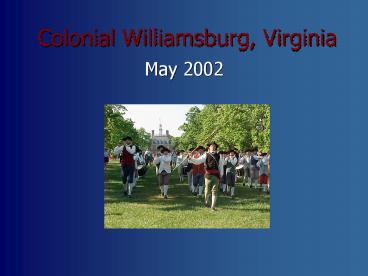Colonial Williamsburg, Virginia - PowerPoint PPT Presentation
1 / 13
Title:
Colonial Williamsburg, Virginia
Description:
During the revolutionary war, he fled Virginia and returned to England. The front entryway of the palace contained many weapons. Weapons were used to show power ... – PowerPoint PPT presentation
Number of Views:959
Avg rating:3.0/5.0
Title: Colonial Williamsburg, Virginia
1
Colonial Williamsburg, Virginia
- May 2002
2
Governors Palace
Lord Dunsmore was the first Governor of Virginia.
He was appointed by the King of England.
During the revolutionary war, he fled Virginia
and returned to England.
3
The front entryway of the palace contained many
weapons. Weapons were used to show power wealth
All furniture was imported from England (another
sign of wealth).
4
Another sign of wealth was elaborate gardens.
In larger colonial homes, kitchens were in a
separate building (due to fire hazards).
5
Public Transportation
6
Powell House
Mr. Powell was a builder. He had a very large
home. There were many children who lived in the
home, in addition to apprentices who were
learning the building trade from Mr. Powell.
Children were all home-schooled. If you could
read and write your name, you were considered
literate.
7
The Powell house had a riding stable and many
games for children.
8
Geddy House
Mr. Geddy was a silversmith. He had many
children and apprentices living in his home.
England wouldnt send raw materials to the
colonies they wanted the colonists to buy
finished products (that way they could place a
high tax on the products and make a lot of
money). Mr Geddy would exchange scratched
silver/gold pieces for new ones. Then, he would
melt the silver/gold and create new items.
9
Christiana Campbells Tavern
- George Washingtons favorite place to eat!
George Washington, Thomas Jefferson, Patrick
Henry and other patriots would meet at local
taverns to discuss important issues.
10
Peyton Randolphs House
- Peyton Randolph came from a wealthy family.
- He was educated in England and became Speaker of
the House of Burgess. ( Before the revolution,
each town sent a representative to the House of
Burgess.) - Everything in his home reflects his wealth and
standing in the community. The brown paint used
on the home was the most expensive available it
was a symbol of his wealth.
11
He owned 27 slaves and added a section to the
house for them to gather and meet in.
During the revolution, Peyton sided with the
colonists. His brother sided with England and
moved there with his wife and two daughters. His
brothers son remained in Williamsburg and fought
with the colonists for independence.
12
Courthouse Stockade
In colonial times, you had to be careful not to
break the law or youd be tried at the courthouse
and you could end up.
in the stockade!
13
(No Transcript)































